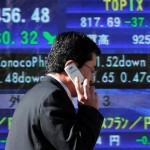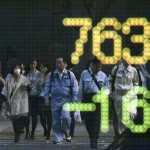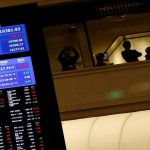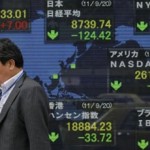Euro Falls as Consumer Prices Drop Most Since 2009; Real Gains
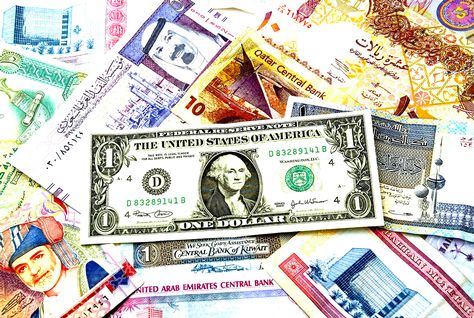
The euro dropped for a fourth day versus the dollar, the longest skid in two months, as consumer prices in the region fell more than economists predicted to strengthen the case for asset purchases by the European Central Bank.
A dollar gauge climbed to the highest since 2005 as a private report showed U.S. companies added more workers than forecast before the Federal Reserve releases minutes of its last meeting amid signs it is moving toward raising interest rates. The 19-nation shared currency reached a nine-year low amid speculation ECB President Mario Draghi will announce a sovereign-bond buying program under the quantitative-easing strategy as soon as this month. Brazil’s real advanced against most major currencies.
“Everybody’s betting on Draghi to need to do something,” Ken Wills, a senior corporate dealer at USForex Inc., said by phone from Toronto. The CPI data “definitely puts the heat on him that he needs to open up quantitative easing to allow sovereigns to be included.”
The euro dropped 0.7 percent to $1.1810 at 9:37 a.m. in New York and touched $1.1809, the weakest level since 2006. The euro gained 0.2 percent versus Japan’s currency to 141.08 yen. It slipped 2.9 percent in the previous three days. The dollar strengthened 0.9 percent to 119.46 yen.
Intercontinental Exchange Inc.’s U.S. Dollar Index, which tracks the currency against six major peers, rose 0.7 percent to 92.177 after climbing to 92.181, the highest level since December 2005.
Real Gains
Brazil’s currency rose for a second day on speculation President Dilma Rousseff’s new economic team will prevail in balancing the budget and restoring growth. The real advanced 0.5 percent to 2.6871 per dollar.
The Nigerian naira climbed for the first time in three days after the governor of the central bank said the nation will never introduce capital controls and is reviewing a rule introduced last month that investors said crushed liquidity in the foreign-exchange market. The currency gained 0.5 percent to 182.95 per dollar.
Switzerland’s franc was little changed versus the shared currency as central bank data showed foreign-currency reserves rose to a record in December, signaling that the institution resumed intervention in the market to stem currency gains and reinforce its three-year-old minimum exchange rate of 1.20 per euro. The franc was at 1.20097 per euro.
U.S. Employment
The dollar extended gains after companies in the U.S. added 241,000 workers in December, figures from the Roseland, New Jersey-based ADP Research Institute showed today. The median projection of 45 economists surveyed by Bloomberg called for an advance of 225,000.
Labor Department data in two days may show private payrolls climbed by 228,000 workers last month as the jobless rate fell to a 6 1/2-year low of 5.7 percent, according to Bloomberg surveys.
Today’s Fed minutes may offer insight into the meaning of the central bank’s guidance that it will be “patient” when considering the timing of the first rate increase since 2006. After its Dec. 16-17 gathering, Chair Janet Yellen said the Fed was unlikely to raise borrowing costs at the next couple of meetings.
The euro fell as consumer prices in the currency bloc dropped 0.2 percent in December, the European Union’s statistics office in Luxembourg said today. That’s the lowest rate since September 2009. Economists in a Bloomberg survey predicted a decline of 0.1 percent. Unemployment held at 11.5 percent in November, Eurostat said in a separate report.
‘Full QE’
With officials in Frankfurt working on a plan to buy government bonds, the currency has also been weakened by renewed political turmoil in Greece. The country is set for elections this month that may bring into power a party opposed to austerity measures that are a condition of the nation’s financial bailout.
A slide in Greek bonds today sent the 10-year yield above 10 percent for the first time since September 2013.
“The ECB has been on a trajectory toward full QE for some time now and all their statements are telling us they’re about to pull the trigger, either on Jan. 22 or, at the latest, the meeting after that,” said Sonja Marten, a currency strategist at DZ Bank AG in Frankfurt. “For the euro, we’ve had a pretty tough couple of weeks. Looking at the next few weeks, the bias is going to remain very much on the downside.”
The common currency has weakened 0.8 percent in the past month compared with a 3.6 percent gain for the dollar and a 5.6 percent jump by the yen among 10 developed-nation currencies tracked by Bloomberg Correlation-Weighted Indexes.
Source: Bloomberg – Euro Falls as Consumer Prices Drop Most Since 2009; Real Gains









